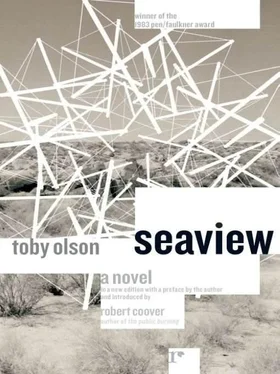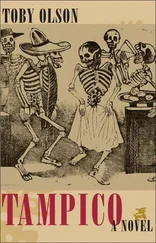It took him a little over an hour to get the seventy miles to Tombstone. As he got closer to it, things along the road became increasingly familiar. The first thing he noticed were the small white crosses at the roadside, markers for the places where accidents had occurred in which people had been killed. When he saw them he remembered how he had seen them when he was in high school, living in Bisbee, twenty-five miles the other side of Tombstone. He knew the road between Bisbee and Tombstone better than this stretch, but he had traveled here some too. He remembered a place, a looping turn from a long downhill slope, where there were more than twenty crosses clustered like a small graveyard at the roadside. Driving into Tombstone with friends, they had dared that turn in the road often, laughing and joking but not untouched by the danger and its evidence in the crosses. Mostly, he had driven to Tombstone with his father for his quack arthritis treatments, baths and massages, that were supposed to produce wonders. They had moved from Chicago to Bisbee for his father’s health. When he was in his second year of high school, his father had died there.
He remembered the last turn into Tombstone, and he slowed down as he entered it. There had been considerable building on the edge of town since he had last been there close to twenty years ago, but after the turn, Boot Hill still sloped up to the left, a low-brush rise with its wooden and stone markers, now with an out-of-place cyclone fence surrounding it. A little farther down on the right was the O.K. Corral, and by the time he reached it he had slowed to a crawl. The O.K. had changed also; it had been “restored” with new paint and a new sign, and some boards had been replaced, and the grounds had been worked on. Down the streets beyond the O.K., little signs had been hung out in front of the various stores, markers with historic names wood-burned into them. He turned at the corner of the Crystal Palace Bar, drove down a half block, and parked. There were tourists walking the streets, cars with various out-of-state plates, but there were not a lot of tourists, and the town did not look to be thriving. Across the street from the Crystal Palace, he saw the vaguely remembered Bird Cage Theater and the Tombstone Epitaph , the old newspaper, beside it. He turned into the Crystal Palace, pushing one of the swinging half-doors and slipping through it like a hesitant cowboy.
There were six men sitting at the bar, five facing the long glass mirror behind it, the other at a place where the bar turned in an L to the wall, a position where he could see the door. In front of the mirror, obscuring its lower part, were hundreds of bottles of liquor, about half of which were phonies, empty bottles with Old West labels on them. The mirror was high, long, and beautiful, its edge framed in gilded wood or plaster. The bartender had a striped shirt and a handlebar mustache. He nodded to him as he entered. Two of the men at the bar were cowboys, real ones, in boots, Levis, pearl-button shirts and Stetsons. The three men beside them were tourists, all of them heavy and dressed in various combinations of seersucker and brushed cotton. The man at the turn of the L-he thought this was his man the moment he entered-was young, about thirty; he wore a tailored cowboy shirt, dark blue, but he was hatless. A beer bottle stood on the bar in front of him. He smiled as the stranger approached. Allen got there, sat down, and ordered a Lone Star.
There was the sound of gunfire outside, and the two cowboys sitting beside him laughed when it came, shaking their heads.
“The bloody Chisholm battle is on again,” one of them said.
“No, that’s Gunfight at the O.K. Corral, I think,” the other said.
“Maybe so.”
“Think it is,” the bartender said.
He remembered the Frontier Days weekend that occurred each summer in Tombstone, in August he thought. There were reenactments of all the famous Old West battles that the town in its heyday had witnessed, at least twenty of them. All of the historic businesses would be enlivened by people in traditional Western costumes. The Bird Cage Theater would be open, presenting the shows that had been popular in the middle of the last century. And there would be a lot of beer drinking, some real fights, and a lot of barbecues. He remembered that one of the traditions was to try to get enough beer drunk on that weekend so that by the end of it the block at the center of main street would be covered, from curb to curb, with empty cans and bottles. This end was usually accomplished.
“Frontier Days?” he asked.
“Naw, that’s not till August, the twelfth this year, isn’t it Ray?”
“That’s right, I think,” one of the cowboys answered the bartender and looked over at the stranger. The cowboy was about forty-five years old; he looked very strong and hard. His face was sun-leathered, his eyes a little milky. The man in the L of the bar tipped up his beer, paid for it, and left. The tourists finished up and left too. The bartender went to the end of the bar and gathered their glasses and started to dunk them into a vat of water behind the bar. The cowboy was still looking at him.
“Leak,” he said, and he got up and headed for the door under the sign that said Hombres in the far corner of the large room. When the cowboy got off his stool, Allen saw that the other one was hunched down over his beer, sipping at it by lifting it only a couple of inches off the bar. His hat was cocked back on his head, and he was looking straight ahead into the mirror.
When he saw that the cowboy had reached the door in the corner, he slipped off his stool and followed him. When he entered the wood, tile, and porcelain room, he saw the cowboy standing at a urinal, and he stepped up to one, two urinals away from him. The cowboy looked over sharply at him.
“You know Richard?”
“I know him,” he answered.
“We’ll do it in fifteen minutes. It’s three-thirty now. There’s a place up the street, a sign says Rose Tree . You turn left.
The other side of the rose tree is a house with a lot of bottles on the roof, I mean hundreds of them. Behind that house. You can’t miss it. You better walk over.”
“I know the place,” he said.
“Do you,” the cowboy said, raising his eyebrows a little.
“Fifteen minutes.” He zipped up his fly and left. Allen waited a moment and then left too. He went out the swinging doors of the Crystal Palace, turned left, and headed forthe car. He got into the driver’s seat, reached under it, and got the matchbox. Then he got a small, plastic shopping bag, with hand holes cut into it, out of the glove compartment and put the Diamond matchbox into it. The bag was black and had the name of a store printed on it.
He began to get out of the car but changed his mind. He started the car and drove it around the block, parking it parallel to the road in a space with a driveway in front of it. It was pointed with the traffic, on the street that led out of the town to the highway, back in the direction of Tucson. He got out of the car, the plastic bag in his hand, and walked to the corner, turned left, and headed for the street on which the Crystal Palace was located. He was a block away from the Palace, at the corner where the rose tree sign was, when he got there. He checked his watch. It was three-thirty-seven.
He remembered the rose tree and the house with the bottles because it was near them that his father had come for his treatments. The rose tree had been called “The Largest Rose Tree in the World”; it had cost a quarter to see it, and it had been surrounded by a high fence. The bottle house had belonged to a woman who had for years put bottles on her roof to let the sun stain them. It took close to twenty years to get a good bottle that way, but he remembered them as being very beautiful, and she had sold them for what was then good money, about ten dollars apiece, more for the special ones.
Читать дальше












